
6 Reasons Why Swimmers Do Better in School
Swimmers often excel academically, proving that success in the pool can translate to success in school. Here’s a look at why swimmers kick fast in the pool and kick butt in the classroom.
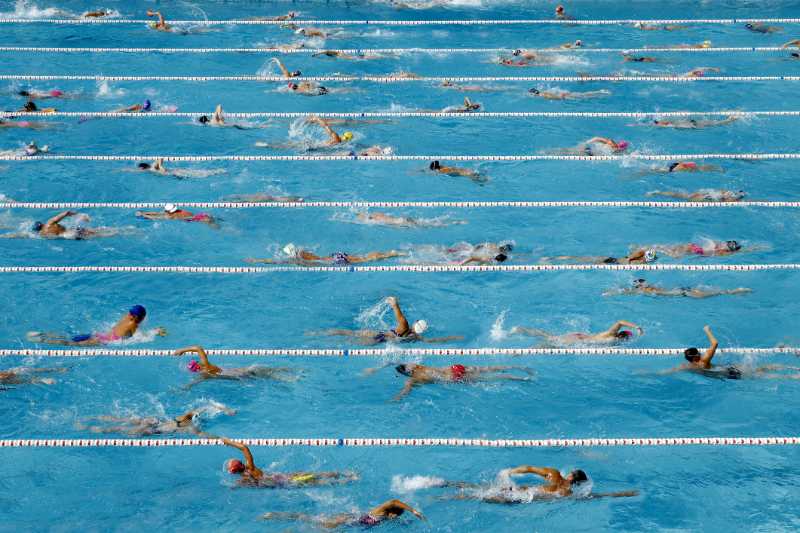
The journey becoming a competitive swimmer is fun, challenging, and unique. Here are 26 things you learn becoming a competitive swimmer.
Ah yes, the trials and tribulations of being a competitive swimmer.
At this time of year when the days are short, the tan from your winter training camp has long ago faded, and the glory of summer and the outdoor swimming that it brings feels like it will never come, our motivation can start to sag.
We begin to look longingly at the shorter seasons of other sports like basketball or football.
As a reminder of why our sport is so special, here are 24 reminders of the things you learn on your way to becoming a kick-butt swimmer–
Swimming looks simple enough when it comes to apparel and equipment. Swimsuit–check. Swim goggles–check. Good to go, right?
Uh, wrong.
You need your pull buoy, kickboard, four different sizes of hand paddles, swimmer’s snorkel, spare goggles, tech suit, drag suit, training suit, swim fins, and a garbage-bag sized mesh bag to hold it all in.
And then your water bottle, energy drink, post-workout shake, and post-workout snack.
There will be days when you loathe going to workout, where the last thing you want to do is strap on your training swimsuit and bang out another early morning workout.
But you will always love the thrill of seeing your hard work pay off in competition.
Even after your days of competitive swimming are wrapped up, you are going to love the health benefits that come from swimming.
Late for your race? Deck change. Ripped your suit? Deck change. Don’t want to use the locker room with all those grubby public swimmers? Deck change.
Competitive swimmers regularly break land-speed records for changing clothes.
Those moments will etch themselves in your memories for life: Standing on the blocks, your brain and stomach exploding with race-time adrenaline while your teammates are going buck wild in the stands. It’s for those moments that we do what we do.
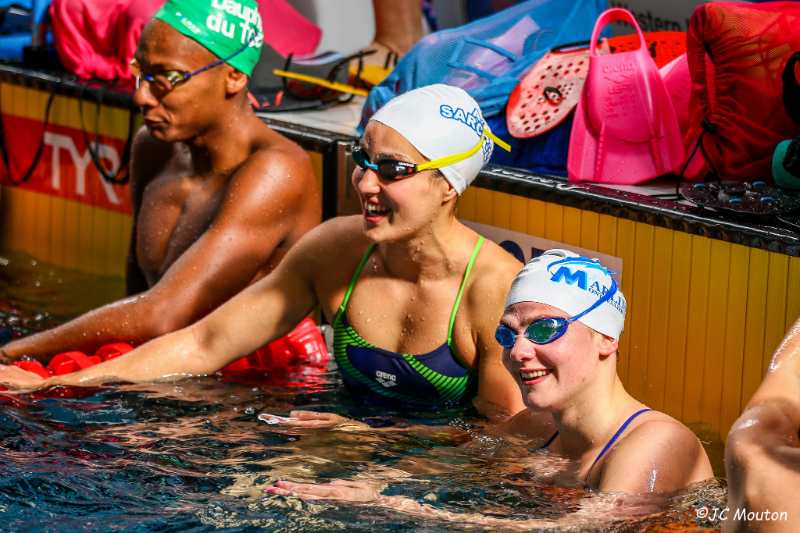
Swimmer’s appetites are legendary, and even though Michael Phelps’ 12,000 calories per day diet was completely overblown, the suggestion that a swimmer could do it was plausible enough that the bogus story was rebroadcast by NBC and other major news sources.
If you want to see horror, look at the faces of a server at local pasta restaurants when a swim team walks in after a full day at a swim meet.
No, we don’t know Michael Phelps, we don’t swim laps – we swim yards or meters, and yes, you can laugh all you want about the fact we wear a Speedo – we wear it rather happily in the company of fit members of the opposite sex – who are also wearing them.
Nothing gets your attention faster than banging your hand against a ladder or a flag pole. Never mind the moving targets that include paddled-hands, and that dude whose breaststroke kick is so wide he could hit both lane lines on either side at the same time.

The gap between the beginning of the season and championship season for swimmers can be anywhere from 6-11 months. That is a long time.
To keep yourself motivated and jacked up to work hard in the pool 10 times a week takes some intelligent planning.
Whether it is short-term goal setting, focusing on cycle-specific goals, or best of all – taking things one day at a time, swimmers learn how to plan for the long haul and understand delayed gratification than most athletes.
Travel, hotels, and swim fees all add up, especially considering that swimming is not a 3-4 month season; it features 11 months of travel and competitions to help mom and dad’s pocket get a whole lot lighter in a hurry.
And of course, the grocery bills tend to be longer than a 50m pool.
Nothing like a 1500-person swim meet to be held at a tiny 25-yard pool to make you feel like you are sharing a phone booth.
It’s dog-eat-dog, and in order to find enough space to place your bag and swim towel, you need to get there nice and early.
Get to the pool late? Looks like you get to put your gear under the stands. Sweet.
Nothing wakes you completely quicker than putting on a wet suit the next morning.
It’s understandable that after a long PM practice that the last thing you want to do is empty the metric ton of swim gear in your bag (see #1, #21), but to be fair, no one should expect to make decisions that involve the future when in a state of sizable carb-deficit.
During those epically long sets, after the fifth 1000-yard rep, your arms and shoulders lose feeling, and yet you swim on, as though on auto-pilot.
If you walk into practice with a song in your head, by the end of practice you can’t wait to go home and download it.
Nothing turns a song from lukewarm to “gotta-have’it!” more effectively than singing the chorus of the said song a kajillion times over the course of a workout.
Which goes to show, if you wanna maintain your hipster status, avoid the top 40 stations on the way into the pool.
Oh, the glory to swim in the rarefied waters of your own lane.
No matter how exhausted your body is, no matter how hard you trained, when that one morning completely off comes around you get an extra fifteen minutes, and not a minute more. Sigh.
Having a bad swim happens to everyone. False starts, DQ, injuries all happen – but when you’re at a swim meet you don’t have time to dwell in negativity – there are more races to race.
You know how motorcyclists and joggers do that thing where they wave at each other when they pass one another?
Well, we’re cooler than that. You can buy a motorcycle, or strap on a pair of running shoes and go for a run.
Swimmers forge a bond over thousands and thousands of hours in the pool, of long trips in the back of the parents’ mini-van, of the shared triumph of winning a meet.
I was generally the last person out of the pool during meet warm-ups. The last 15 minutes and the first 15 minutes are almost always the quietest.
It’s that middle, the white creamy part of the Oreo, that is a nightmare.
Where every single swimmer at the meet is in the pool at the same time, all doing something completely different.
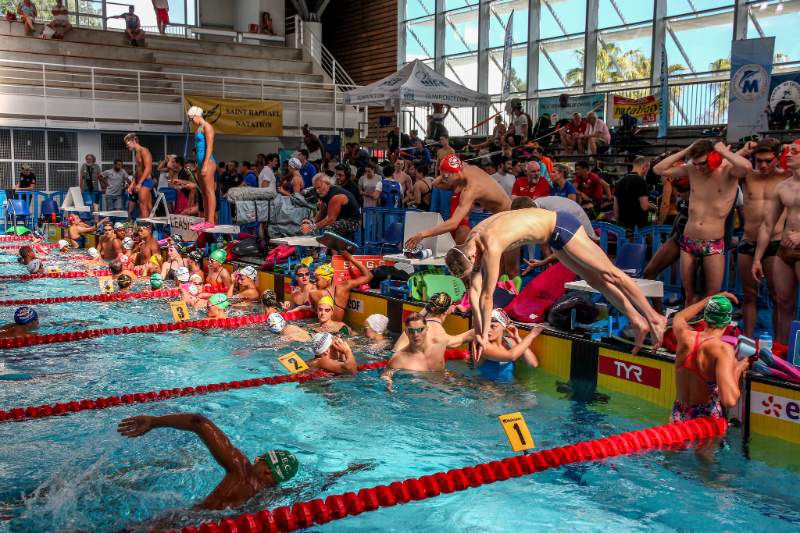
While non-swimmer friends may chide us for the no-impact aspect of our sport, they have clearly never participated in a swim meet warm-up. It’s a frothy, bubbling mess of fast-moving limbs, frequently colliding into one another.
Also, if you choose to stand at the “T” in the middle of the lane, there is a moderate-to-excellent chance someone will flip-turn on you, delivering a double-heel strike.
Not having the constant distraction that slide over us like an avalanche over the course of the day means that we actually get a few minutes alone with our thoughts.
It’s in these quiet moments where we go over that algebra equation from class, work on our French, and think about that one day
We understand that underwater music players don’t work for serious swimming, anti-fog swim goggles are largely a myth, and that messing with a swimmer’s taper is the quickest way to incur their wrath for life.
As Isaac Newton notes, “an object in motion remains in motion.”
This is key to remember after a 7,000m distance sesh and you have things to do, whether it’s making dinner, doing homework, or even just emptying your swim bag.
Do it immediately, because there is no chance you are moving for at least an hour soon as your butt hits that couch.
Circle swimming? Check. Passing while shoulder-checking and not bumping into the swimmer next to you? Yup. How about swimming in a lane that is reflective of your speed? You know it.
“Is that lifeguard checking me out? Wonder if she knows that I’m holding 30’s on this set. Sick.”
We’ve all had those times where a good song helped us conquer and push through a workout.
Whether it was in your head the moment you got in the water, or you had it bumpin’ on repeat through a set of waterproof headphones made specifically for swimming, the beats saved your butt that day.
Coaches can be cruel. They’ll give you a preview of the next day’s swim practice, which usually runs along the line of a distance fly or free set.
That night you’ll lay in bed tossing and turning, visions of failing shoulders and missed intervals splashing around your brain until you wake up the next morning in a cold sweat, thinking of all the excuses you could use to duck out.
Eventually, you make it to practice, do the assigned warm-up, and start the main set. Whether it was the time you did 10×200 fly, or a 5k for time, whatever it was…
You did it. Sure, it hurt, you struggled, but you stuck with it and ultimately kicked that set’s butt.
12 Things You Learn Becoming a Swim Parent. The swimmer lifestyle is unique, and so it is for their parents as well.
6 Reasons Why Swimmers Do Better in School. Swimmers often excel academically, proving that success in the pool can translate to success in school. Here’s a look at why swimmers kick fast in the pool and kick butt in the classroom.

Olivier Poirier-Leroy Olivier Poirier-Leroy is the founder of YourSwimLog.com. He is an author, former national level swimmer, two-time Olympic Trials qualifier, and swim coach.

Swimmers often excel academically, proving that success in the pool can translate to success in school. Here’s a look at why swimmers kick fast in the pool and kick butt in the classroom.
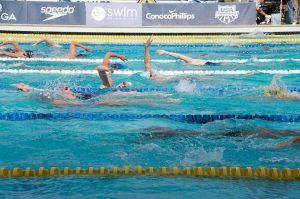
As someone who trains almost exclusively during open lap periods I have experienced more than my fair share of lane ragey moments. Last night, for instance, a family of four head up breaststrokers jumped into the fast lane and breaststroke’d their way up the middle of the lane. When I

The swim goggle is a fundamental part of our training and our racing. Like the smell of chlorine, soggy suits between practices, and the occasional kickboard getting thrown at our heads, it’s an essential part of our sport. Swim goggles help us see underwater, see the competition, and see our

Sweet tan lines, big shoulders and excessive amounts of cardio. Here are just 7 of the benefits of swimming.
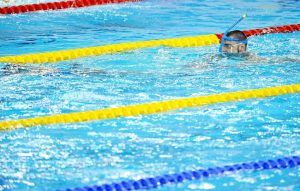
Here are 16 ways that every swimmer makes their swim coach go a little bit crazy. Sorry coach!
SITE
SHOP
GUIDES

LANE 6 PUBLISHING LLC © 2012-2024
Join 33,000+ swimmers and swim coaches learning what it takes to swim faster.
Technique tips, training research, mental training skills, and lessons and advice from the best swimmers and coaches on the planet.
No Spam, Ever. Unsubscribe anytime.
